
Meet Jennifer Lim, our partner UBC Djavad Mowafaghian Centre for Brain Health Project Assistant and Language Project leader, presents the project at a glance:
From Classroom to Community: The project at a glance
Scope: 2 SPAN 301 sections, total of 41 students, 1 graduate student (TA and SFC Work-learn),
Project led by: Instructors, Dr. Maria Carbonetti, SFC director and course coordinator, and Dr. Anna Casas Aguilar for the FHIS, and Jennifer Lim, BSc, co-instructor and project assistant.
The BC Wellness Program
The BC Brain Wellness Program is a unique and interactive program establishing clinically relevant lifestyle approaches to complement medical treatment in the clinics at the Djavad
Mowafaghian Centre for Brain Health. By combining traditional clinical care with interventions that support healthier lifestyles, the program’s goal is to improve and sustain quality of life and
function for its participants while pursuing rigorous research into lifestyle interventions for brain health. In addition, the program provides learning opportunities for medical professionals and
the general public on brain wellness practices and enhanced educational experiences for UBC students from a wide range of fields.
The program fosters interdisciplinary collaborations with UBC programs, including Physiotherapy, Kinesiology, Occupational Therapy, Neurology, Psychiatry, Neurosciences, Sports Medicine, Nutrition, Psychology and the School of Music as well as several community partners.
The main goal of this language project was to prioritize the program’s accessibility and inclusivity by breaking down language barriers. Through a series of for-credit Canvas modules created by the program, the students were able to gain hands-on language translation experience and an opportunity to familiarize with scientific language. Not only did they strengthen their translation skills, but also deepened their awareness implied in language mediation.
The instructors ensured that this project adhered to course learning outcomes, for both linguistic and cultural aspects of the project, as well as all language competencies in reading, writing, speaking and listening. Building cultural relationships was a priority; specific topics were enriched through community events where Spanish-speaking professionals in the field of mental health and cultural studies presented in a culturally-relevant context.
From a linguistic point of view, not only did the project allow students to review and apply fundamental language skills like grammar, but also gave them the opportunity to deepen their intercultural awareness implied in language mediation. The students greatly benefited from learning about the nuances in the Spanish language as well as niche topics in neuroscience, brain health, and mental well-being.
The project included direct interaction with members of the community. We were delighted to offer our students the possibility to learn from experts guest speakers, in English and Spanis:
Guest Speakers Series:
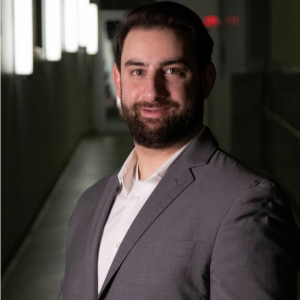
Dr. Matthew Sachelim Research Program Manage if the BC Brain Wellness Program.

Dr. Rafael Casas, MD Psychiatrist, Youth Program, Centre de Salut Mental Nou Barris, Barcelona, Spain

Stefanía Cardonetti, PhD Candidate, Researcher CONICET- UDESA (Universidad de San Andrés) -UNQ (Universidad Nacional de Quilmes), Argentina
Curriculum integration
Level: Intermediate B1
The goals of this project are as follows:
1. Expand the reach of our programs and resources to a wider community of people
2. Prioritize our program’s accessibility and inclusivity by breaking down language barriers
3. Offer hands-on language translation experience for UBC Language students
4. Provide an opportunity for students to familiarize with scientific language
5. Build interdisciplinary relationships with the UBC Language Department for future projects
As part of the pilot language project of the BC Brain Wellness Program from the Faculty of Medicine, students of SPAN 301: Intermediate Spanish translated in-house educational
materials resources pertaining to the health sciences, particularly brain health.
To conclude the semester, we held a final presentation session that consisted of group oral presentations and sharing memorable experiences from the project. Overall, this project truly
embodied the essence of the SFC by forming meaningful, interdisciplinary relationships at UBC in order to ultimately serve the community. Read more
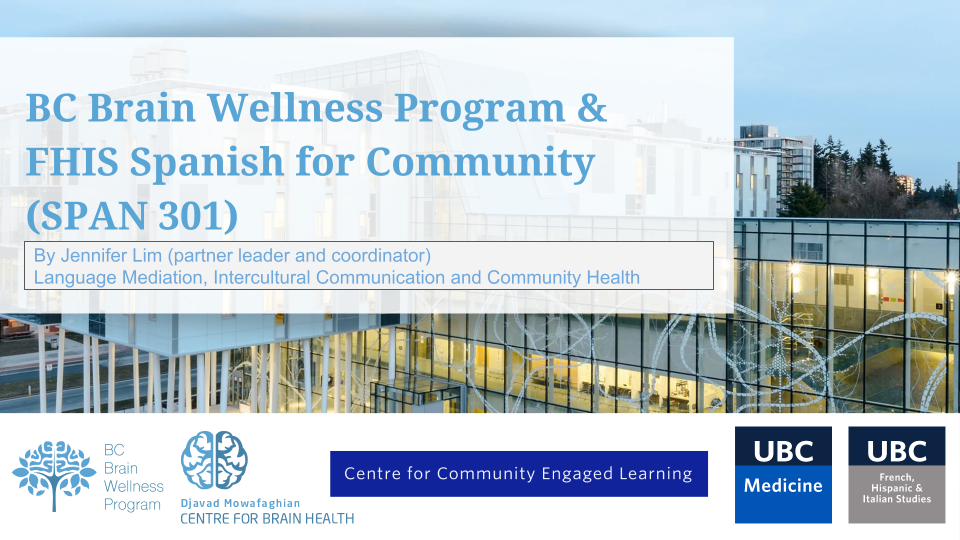

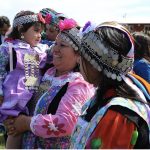
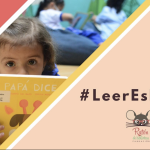
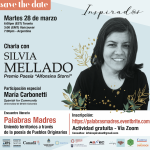
Comments by Maria Carbonetti